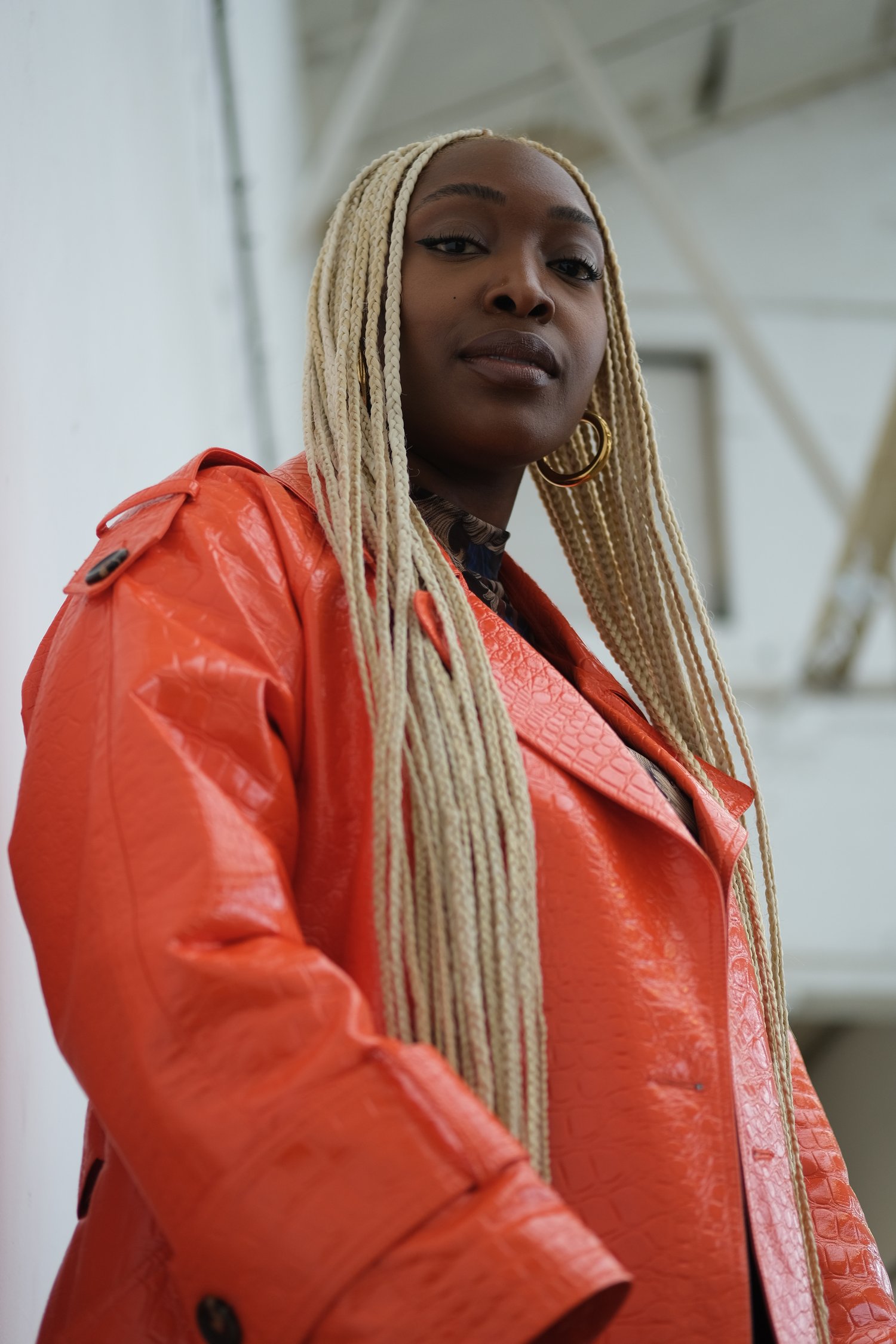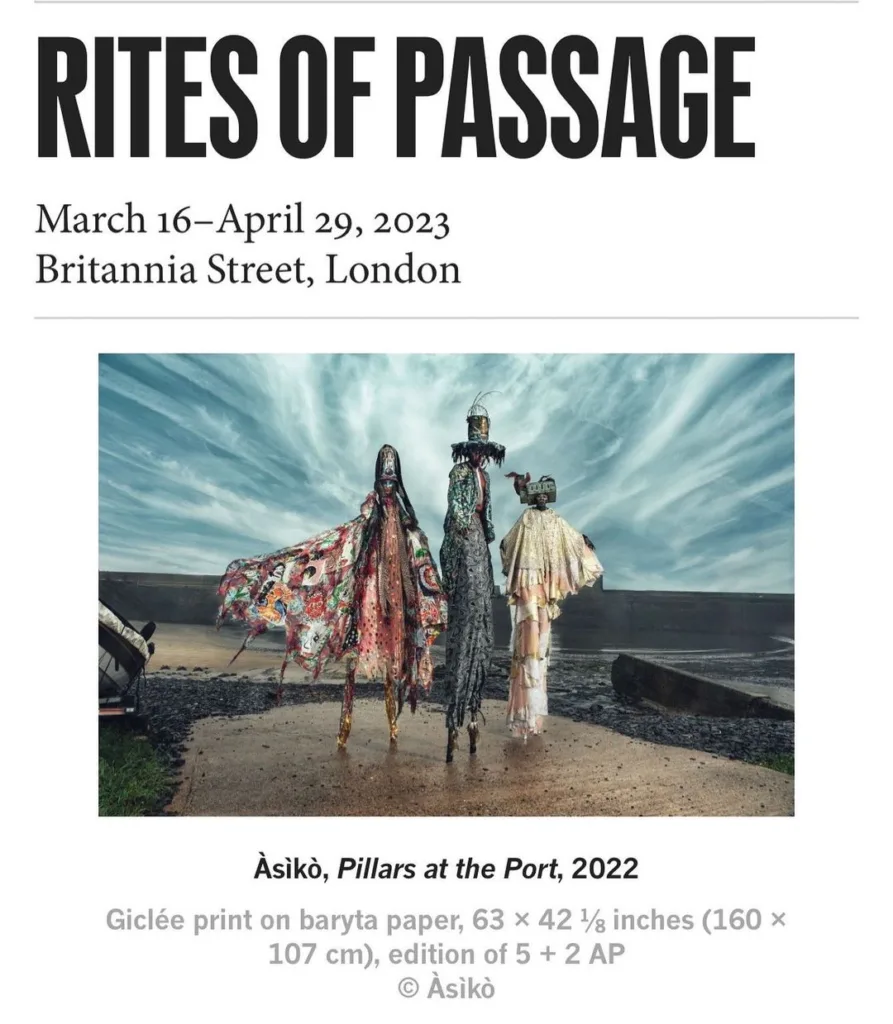Since joining Mega-gallery Gagosian, which exhibits and provides space to some of the most influential artists of the 20th and 21st centuries, as an associate director, Péjú Oshin curates for the first time. The exhibition titled ‘Rites of passage,’ shows her excellent skill and exquisite talent as she ties nineteen artists with shared migration histories to showcase at the gallery.

Péjú Oshin is a British-Nigerian curator, writer and lecturer born and raised in London. Her work sits at the intersection of art, style & culture with a keen interest in liminal theory and diasporic narratives. Core to her practice is working with visual artists, brands and people globally.
Since starting her career working in arts & culture in 2015, Péjú has worked broadly in engaging audiences through public programming, exhibitions, and outdoor art projects in a number of cultural spaces and institutions with a history of supporting artists at various stages of their careers.
Péjú’s curated Rites of Passage which explores the idea of “liminal space,” a coinage of anthropologist Arnold van Gennep (1873–1957). The exhibition is structured in correspondence with liminality’s three stages: separation, transition, and return. Each of these phases addresses the act of movement, not only through individual experience, but also in the broader context of community. The exhibition examines the status of postcolonial Black identity, specifically the “triple consciousness” experienced by members of the African diaspora when encountering counterparts who identify with local majority populations. The artists in the exhibition are further grouped together according to themes of tradition, spirituality, and place.
Stitched together in this exhibition are astounding African visual artists; Tunji Adeniyi-Jones, Àsìkò, Phoebe Boswell, Adelaide Damoah, Femi Dawkins, Victor Ehikhamenor, Mary Evans, Ayesha Feisal, Enam Gbewonyo, Elsa James, Julianknxx, Sahara Longe, Manyaku Mashilo, Emily Moore, Nengi Omuku, Patrick Quarm, Alexandria Smith, Sharon Walters and Michaela Yearwood-Dan.

Elsa James’s Ode to David Lammy MP (2022), the black neon text reads I AM HERE BECAUSE YOU WERE THERE, is a powerful affirmation of placemaking that originates in a 2018 speech made by the MP in response to the Windrush scandal, in which British subjects—many of whom had arrived in the country from Caribbean nations decades earlier—were wrongly detained or threatened with deportation. The experiences of the Windrush generation also inform the work of Enam Gbewonyo, who investigates cultural history through the manufacture and manipulation of textiles. Patrick Quarm, too, identifies significance in fabric, uncovering the cultural reflectivity that lingers within batik material despite its highly commodified status. And Adelaide Damoah, for her part, explores colonial history by transposing texts and maps onto photocollages of herself and her mother, grandmother, great-grandmother, and great-great-grandmother, thereby contesting outdated ideologies imposed on her familial narrative.
The exhibition’s spiritual theme emerges in works from Manyaku Mashilo’s Celestial Cartographies (2020–), a series of paintings in which imaginary characters move through abstracted cosmological landscapes that refer to African faiths and identities. In his tapestry, Victor Ehikhamenor stitches thousands of rosary beads to canvas and lace, cutting across history, memory, and belief to explore the role of religion and spirituality as tools for both survival and oppression. Àsìkò, in his photographs, recombines and extends various masquerade traditions rooted in Yoruba history and culture to explore how the representation of ancestral communities might inflect contemporary diasporic identities, while Julianknxx’s film installation considers the integration of liminality into Krio traditions as a waypoint between and construction of both local and global perspectives.
Finally, in the works of many artists in the exhibition, such ideas intersect with perspectives on the complex and consistent influence of place. Phoebe Boswell considers bodies of water as repositories of both painful historical experience and hope for the future—natural loci of healing, reclamation, and possibility—while Mary Evans employs pop-cultural imagery to examine the relationship between contemporary Britain and its imperial past through the lens of her own childhood.
About Péjú Oshin

Her previous work and projects include managing the delivery of the Workshop Artists in Residence programme, curating live performance Stillness: We Invoke the Black to Rest (2020), Beyond Boundaries (2021), Late at Tate Britain: Life Between Islands (2021), Late at Tate Britain: Hew Locke (2022) and in-person and online programming at Tate. Leading Barbican’s first Young Curators Group (2019-2020) and delivering a number of public-facing events at Wellcome Collection in response to exhibitions such as Living with Buildings and Being Human.
Academically, Péjú has a background in Architecture & Design which is connected to her interest in space and place. In 2019 Péjú completed her PgCert in Academic Practice in Art, Design and Communication at University of the Arts London and in that same year received her status as an Associate Fellow of the Higher Education Academy (AFHEA). She is an Associate Lecturer at Central Saint Martins and most recently taught on the Graduate Diploma in Fashion and previously on the MA Applied Imagination (2018 -2019) as well as guest lecturing on courses across the different colleges within the university. Additionally, Péjú was a visiting Critic at the Royal College of Art for the School of Paintings in 2020.
As a writer, Péjú has written texts for artists which have been used in exhibitions and solo presentations of artists internationally. She has also been commissioned to write for various platforms and published her first collection of poetry and prose Between Words & Space (2021) which explores performativity, a fear of vulnerability both in public and private spheres and relationships in their varying complexities through the nuances of culture, liminality and where we find home.
In 2021 Péjú was shortlisted for the Forbes 30 Under 30 Europe list in the Arts & Culture category and nominated and selected for one of fifteen memberships to AWITA sponsored by Martin Millers Gin, the Adara Foundation and Hauser & Wirth (2021). More broadly Péjú has continued to support emerging talent in the arts by being on committees for the JW Anderson X AWITA rolling exhibition programme (2022), Huxley-Parlour’s fourbythree initiative (2021), The Other Art Fair 2021, and a judge for the Cultural residency at the Institute of Imagination (2019).
Péjú is an Associate Lecturer at Central Saint Martins. She previously worked at Tate (2018-2022) most recently as Curator: Young People’s Programmes.


